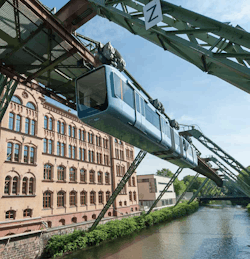At InnoTrans 2016 in Berlin, Vossloh Kiepe showcased some of the innovative components of the new Wuppertal suspension railway cars. Apart from traction converters and an air conditioning system for the driver’s stand, industry experts were able to witness the world premiere of the highly advanced bogie in the pavilion of Vossloh Kiepe in the outdoor display area.
Although the basic design of the new cars was taken over from the existing vehicles — the three-part articulated railway cars of the GTW 2014 type are 79 feet long and 7.2 feet wide — the new generation of the Wuppertal suspension railway cars features unique innovations in lightweight construction, traction engineering and ride comfort. Moreover, Vossloh Kiepe for the first time acted as the general contractor for a complete vehicle. 31 new cars will be delivered to the municipal operators WSWmobil GmbH and by 2017 have completely replaced the old articulated railcars dating back to 1972.
With the (monorail) design of the suspension railway in mind, weight was the primary concern of the designers. Thanks to a special lightweight construction, the new cars weigh less than 25 tons each. The body consists of extruded aluminum hollow sections and the front and rear cabs are made of a glass-fiber composite.
The strong and low-maintenance gearboxes, which were especially developed for the suspension railway, are likewise weight-optimized. Each vehicle has four motor bogies with one motor/gearbox assembly each, which serve as longitudinal drives. Every two longitudinal drives per component are controlled as a group drive. Traction is provided by three-phase motors designed for a 750v DC grid. They ensure smooth, yet speedy acceleration and operate virtually without wear which, in turn, reduces the maintenance cost over the long term. This highly advanced traction system will also allow an increase in service frequency to every two minutes. The train control system is completely new, too. The maximum speed of the vehicles is 65 km/h.
The project also placed great emphasis on minimizing environmental impact. The regenerative braking system feeds electricity back into the grid and highly efficient converters serve both the traction and the on-board power supply and ventilation system. In addition, the vehicles feature modern passenger information systems with TFT monitors as well as air handling units for optimum passenger comfort. Drivers can enjoy a state-of-the-art workplace with air conditioning. The entire control and software of the new cars was developed in compliance with CENELEC standards.


